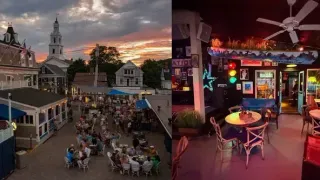March 26, 2021
Buttigieg Pitches 'Once in a Generation' Infrastructure Fix
Hope Yen and Kevin Freking READ TIME: 4 MIN.
Transportation Secretary Pete Buttigieg called for a once in a generation infrastructure investment Thursday that would address a massive backlog in needed improvements for the nation's roads, bridges and transit systems, while also tackling climate change.
Buttigieg avoided specifics on how it would be paid for, but said that the current level of investment poses "a threat to our collective future."
"Across the country, we face a trillion-dollar backlog of needed repairs and improvements, with hundreds of billions of dollars in good projects already in the pipeline," Buttigieg said. "We see other countries pulling ahead of us, with consequences for strategic and economic competition. By some measures, China spends more on infrastructure every year than the U.S. and Europe combined."
The hearing exposed some of the obstacles that President Joe Biden's administration will face as Congress takes up a public works buildout, testing Biden's campaign promise to reach across the political aisle to address national problems.
Congress just passed a $1.9 trillion COVID-19 relief bill and Republicans are wary of adding trillions more to the national debt. They are also worried about how far Democrats intend to broaden the scope of infrastructure to include investments designed to move the country toward net-zero carbon emissions.
"A transportation bill needs to be a transportation bill – not the Green New Deal," said Republican Rep. Sam Graves of Missouri, referring to a sweeping Democratic plan to shift the U.S. economy away from fossil fuels. "This needs to be about roads and bridges. ... The more massive any bill becomes, the more bipartisanship suffers."
Buttigieg's appearance before the House Transportation and Infrastructure Committee came as Biden has been meeting with economic advisers on an emerging $3 trillion package of investments on infrastructure and domestic programs. He is set to release details in a speech in Pittsburgh next week.
Biden said at a news conference Thursday that his proposal aimed to create a significant number of "really good-paying jobs," which "used to be a great Republican goal and initiative." He added that a "majority of American people" are tired of decaying infrastructure, such as roads and bridges badly in need of repair, due in part to the impact of climate change.
"I find it frustrating," he said. "There's so much we can do that is good stuff, makes people healthier and creates good jobs."
Addressing wary Republicans balking on Biden's biggest policy initiative, Buttigieg called the coming months "the best chance in any of our lifetimes to make a generational investment in infrastructure" and emphasized new investments to curb climate change.
"Climate change is real," he said. "Every dollar we spend rebuilding from a climate-driven disaster is a dollar we could have spent building a more competitive, modern and resilient transportation system that produces significantly lower emissions."
Republicans pressed Buttigieg for more details on how the Biden administration plans to pay for infrastructure improvements, but the secretary was vague. He said he understands that cooperation from Congress will be needed to "arrive at a healthy balance of how this can be at least partially paid for."
The administration's proposal, which is not yet finalized, would break legislation on the priorities into different pieces, including an infrastructure component to boost roads, bridges, rail lines, electrical vehicle charging stations and the cellular network, among other items, in a bid to attract Republican support.
A second component would include investments in workers with free community college, universal pre-kindergarten and paid family leave, according to a person familiar with the options who insisted on anonymity to discuss private conversations.
Some Democrats have privately told the administration that they will likely have to bypass Republicans and use their narrow party majorities in the House and Senate to pass infrastructure plans through a process that requires 51 votes for Senate passage.
Asked Thursday whether Democrats intended to work with Republicans on infrastructure, Senate Majority Leader Chuck Schumer, D-N.Y., said "in areas where we can work with our Republican colleagues, we will."
"Hopefully we can get them to work with us," he told reporters. "But as I said, if we can't, we're going to have to move forward."
Rep. Peter DeFazio of Oregon, the Democratic chairman of the House transportation panel, said there is broad agreement that the American public wants the nation's crumbling infrastructure rebuilt.
"They're tired of potholes, they're tired of detours, failed bridges, congestion and all the problems," DeFazio said. "They're tired of water mains that blow up and sewer systems that back up into their homes. We can do this."
At the same time, DeFazio said an infrastructure bill will need to focus on the challenges of the 21st century, a nod to climate change. He said the country shouldn't just add new lanes to highways, stressing "that's not what this is going to be about."
Work on this year's infrastructure bill and other green efforts has already begun in full force with committee hearings and closed-door meetings.
On Thursday, a bipartisan group of senators including Sen. Tom Carper, D-Del., and Sen. Richard Burr, R-N.C., introduced legislation aimed at spurring private investment in clean vehicle infrastructure, such as electric charging stations and hydrogen refueling stations for fuel cell vehicles, by expanding business tax credits. Biden's proposal is expected to include federal money to help fulfill his pledge to build half a million electric charging stations, part of a U.S. effort to achieve net-zero emission by 2050.
___
Associated Press writer Josh Boak contributed to this report.






